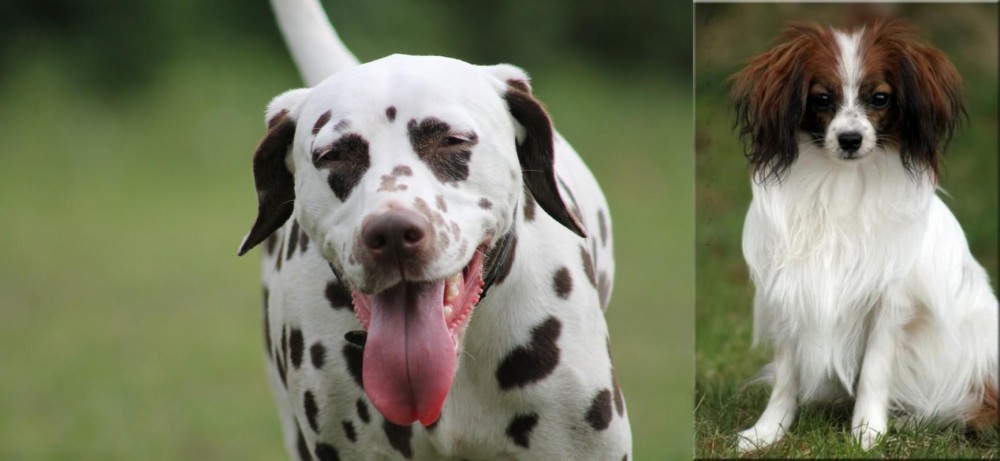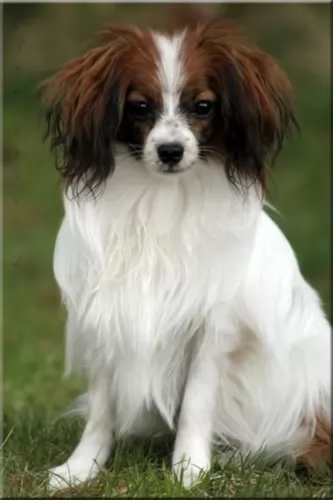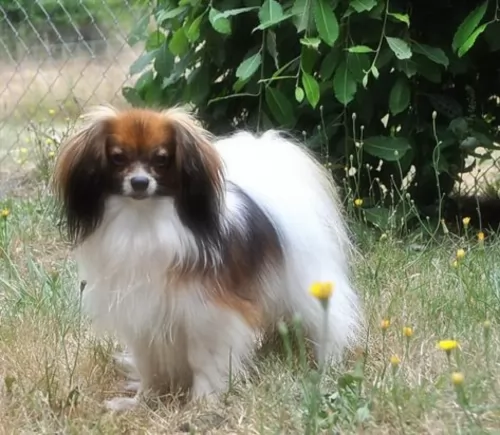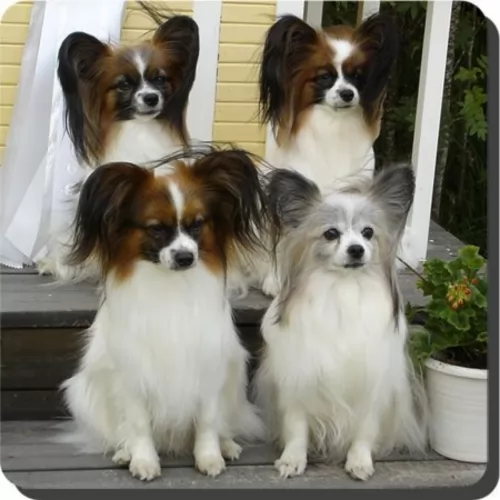 Petzlover
Petzlover Dalmatian is originated from Croatia but Phalene is originated from France. Dalmatian may grow 33 cm / 13 inches higher than Phalene. Dalmatian may weigh 27 kg / 60 pounds more than Phalene. Both Dalmatian and Phalene has same life span. Dalmatian may have more litter size than Phalene. Dalmatian requires Low Maintenance. But Phalene requires Moderate Maintenance
Dalmatian is originated from Croatia but Phalene is originated from France. Dalmatian may grow 33 cm / 13 inches higher than Phalene. Dalmatian may weigh 27 kg / 60 pounds more than Phalene. Both Dalmatian and Phalene has same life span. Dalmatian may have more litter size than Phalene. Dalmatian requires Low Maintenance. But Phalene requires Moderate Maintenance
 The history of the Dalmatian dog is also fairly scant, and the information you get is often unclear.
The history of the Dalmatian dog is also fairly scant, and the information you get is often unclear.
The name Dalmatian wasn’t used until the end of the 18th century, although it seems as though, according to murals on ancient tombs, there were white hounds then with specks over the body.
It does seem firm that the modern Dalmatian is because of breeding of the English nobility. They used these dogs to accompany them on their carriages. The dogs were also bred with the purpose of getting an exquisite spotted pattern.
It was in 1890 that the first Dalmatian Club was established in England and the dog was recognized by the American Kennel Club in 1888.
 The Phalène is a toy breed, and in fact the Papillon and Phalène differ only by their ears, but are exactly the same in all other ways.
The Phalène is a toy breed, and in fact the Papillon and Phalène differ only by their ears, but are exactly the same in all other ways.
Thought to have developed in Western Europe, its exact origin isn’t clear but it is an ancient breed, as paintings seem to indicate that it has been around since the 16th century.
It is essentially a companion dog today. The dog is classified as a variety of the Papillon by the AKC, with the FCI classifying it as a separate breed.
 The Dalmatian is a medium sized dog with its beautiful white coat with black or liver spots being its main feature. The coat is short and dense and the Dalmatian pretty much sheds all year round.
The Dalmatian is a medium sized dog with its beautiful white coat with black or liver spots being its main feature. The coat is short and dense and the Dalmatian pretty much sheds all year round.
It is notable that at birth, the puppies are pure white, with their spots starting to form about 4 weeks later.
Both the male and female stand at anything between 56–61cm in height and weigh between 22 to 35kg. He is a slender, muscular dogs with plenty of stamina. The ears of the dog are floppy, he has brown eyes and a long tail.
With his human family, the Dalmatian is an active, playful dog. He has the reputation of being somewhat unfriendly and aloof, but many who have kept him as a pet say this isn't so. He loves to take part in games and gets on well with children in the home.
He is intelligent, but when it comes to strangers, the Dalmatian is reserved and even aloof. If you want to get the best from your Dalmatian, make sure that he is trained and socialized as he then knows how to behave well around people. He makes a good watchdog too.
 This toy breed stands at between 20 – 28cm in height and weighs around 4 – 5kg. He has floppy, silky ears and is a Papillon dog, and a Papillon with dropped ears is known as a Phalène.
This toy breed stands at between 20 – 28cm in height and weighs around 4 – 5kg. He has floppy, silky ears and is a Papillon dog, and a Papillon with dropped ears is known as a Phalène.
The dome of the head is rounded and the Phalene has a slim muzzle with bright, alert brown eyes and a black nose. The tail is well plumed and is carried over the back. The coat isn’t a double coat like many other dogs, but it is lustrous, being straight, long and smooth. The coat is available in a number of coat colors, essentially being a blend of white, tan, black and orange or fawn.
The Phalène is an intelligent dog, and they will be able to learn quickly and easily when you teach them how to sit, lie down or stay. Training and socialization is always excellent for dogs, even small ones like this as it teaches them to be obedient and well mannered.
The Phalene is a sociable, friendly dog but is inclined to be reserved around strangers. Phalènes are essentially lap dogs and they make great companions for all kinds of people as well as being great playmates for disciplined, kind children. Because he is small and calm, he makes a great pet for country- or city dwellers.
 The Dalmatian is such a beautiful dog, energetic and playful and he is good with pets and children in the home.
The Dalmatian is such a beautiful dog, energetic and playful and he is good with pets and children in the home.
He is intelligent too and training and socialization for him will be easy and promise to bring out all his good points.
The Dalmatian became popular in the 1800's when they were used as coach-dogs, and their popularity has been enhanced because of films from Hollywood such as ‘101 Dalmatians’.
Unfortunately many people receive Dalmatian puppies as gifts after seeing movies like this and then hand their dogs into rescue centers when they grow up and are no longer the cute little puppy they first met.
Be a responsible dog owner. A Dalmatian has feelings and you need to commit to caring for him for up to 15 years. You’ll be rewarded by having a wonderful, loyal canine friend.
 The Phalene is such a sweet little dog, and you can definitely count him as as ‘man’s best friend’. He just loves to be wherever his human family is, lapping up their attention indoors but also loving being with them outdoors. When well trained and socialized, these dogs make splendid playmates for children too.
The Phalene is such a sweet little dog, and you can definitely count him as as ‘man’s best friend’. He just loves to be wherever his human family is, lapping up their attention indoors but also loving being with them outdoors. When well trained and socialized, these dogs make splendid playmates for children too.
Small though he is, he makes a good watch dog too and he will bark to warn his human family of danger. Give him the love and care he so rightly deserves, and he promises to make you a splendid pet and companion.
 Dalmatians, with good care, can live to be about 10 to 15 years. However, just as with other breeds, the Dalmatian is prone to certain health problems that are more specific to their breed. Some of these problems are skin allergies, deafness and urinary stones.
Dalmatians, with good care, can live to be about 10 to 15 years. However, just as with other breeds, the Dalmatian is prone to certain health problems that are more specific to their breed. Some of these problems are skin allergies, deafness and urinary stones.
Dalmatians are known to have sensitive skin and they are prone to topical allergies. When you brush your dog, you should check his skin for redness and also check for fleas and ticks.
Red bumps on his skin could mean an allergy and can be distressing for your pet. Your pet may be scratching excessively and the skin may be red and moist with runny, itchy eyes. It is time to get your dog to the vet, who may prescribe an antihistamines to get the itching and allergies under control.
Unfortunately, the Dalmatian is a dog which has a tendency to form stones in the kidneys and bladder. A genetic mutation causes the raised uric acid levels which is more prevalent with the male Dalmatian. Straining to urinate can be tremendously stressful for your dog and you will need to get him to the vet immediately.
 Your jaunty little Phalene can live to be up to 12 or 15 years of age if well cared for. Even so, there are always some of the more common dog illnesses worth knowing about, and we look at a few -
Your jaunty little Phalene can live to be up to 12 or 15 years of age if well cared for. Even so, there are always some of the more common dog illnesses worth knowing about, and we look at a few -
Any dog can get epilepsy – when your pet suddenly has a seizure or fit for no apparent reason. It can be disturbing to see, but with medication your pet can live a normal life.
Always keep a check on your pet’s eyes because there are a few eye diseases that can affect your pet and these are cataracts, progressive retina atrophy and entropion. Thankfully a veterinary ophthalmologist can help with the best treatment.
 The Dalmatian is an easy dog to maintain and brushing twice a week will get rid of loose hairs. What is notable with the Dalmatian is that not only does he look like a well groomed dog, he also doesn’t have that typical dog smell around him.
The Dalmatian is an easy dog to maintain and brushing twice a week will get rid of loose hairs. What is notable with the Dalmatian is that not only does he look like a well groomed dog, he also doesn’t have that typical dog smell around him.
No matter what kind of dog you have, a high-quality dog food is always beneficial for your dog’s health. Home-made food is always good for your dog and wholesome food such as brown rice, vegetables and some cooked chicken will delight your pet and keep him interested in his food.
There are also excellent manufactured foods and kibble is a good food to have when you select it according to your dog’s age and energy levels.
These foods, especially the top quality ones, ensure your pet gets all the nutrients he needs. Adding some raw meat into the diet can be highly beneficial for your pet and will keep him bright eyed, bushy tailed and with a wet nose.
 These are energetic little dogs and will require getting a regular dose of exercise. He loves a walk and being allowed off his leash for a good run. He also loves ball games. Exercise is important for small dogs like this to ward off obesity.
These are energetic little dogs and will require getting a regular dose of exercise. He loves a walk and being allowed off his leash for a good run. He also loves ball games. Exercise is important for small dogs like this to ward off obesity.
These little dogs will need to have their ears checked and cleaned if you want to avoid ear infections. If you’re not sure how to clean the inside of the ears, rather leave it to an expert who can show you how its done. Small dogs always need to have their teeth checked regularly. He will also need to have his nails trimmed.
To maintain the long, silky coat, brush your dog at least twice a week. Some Phalene dog owners take their pet to the vet to have the coat professionally groomed and trimmed.